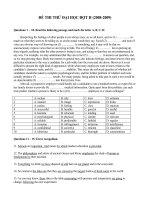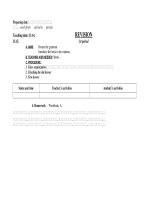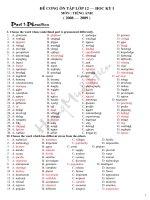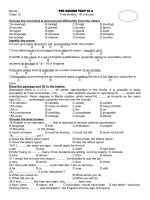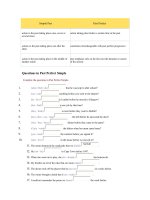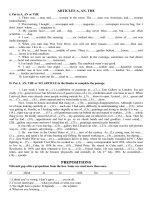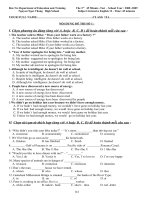tieng anh 12
Bạn đang xem bản rút gọn của tài liệu. Xem và tải ngay bản đầy đủ của tài liệu tại đây (106.29 KB, 5 trang )
<span class='text_page_counter'>(1)</span>UNIT1 : HOME LIFE GRAMMAR :Tense Revision. I.. The Present Simple Tense :. 1. Irregular Verbs : To be a) Affirmative statement (+): Full form I am b) We /You /They / Ns are /She is Full He form : / It / N I We /You /They / Ns He /She / It / N. am not are not is not. Short form = I’m = We’re / You’re / They’re = He’s / She’s It’s Short/form. Negative statement(-) :. = I’m not = We aren’t / You aren’t / They aren’t = He isn’t / She isn’t / It isn’t. c) Yes-No question (?):. Am Are Is. I ……..? Yes, I am . you /we /they /Ns ….? we /you / they are . he / she / it /N………..,? he / she / it is .. No , I’m not . we /you /they aren’t . he / she /it isn’t .. d ) Wh- question (Wh-?): Wh -. am are is. I……? you /we/they/Ns …..? he /she/ it /N……?. Eg : - I’m at school now . - We are students . - My mother is thin . 2. Regular Verbs : S1 = I /You / We /They /Ns /. S2 = He /She / It /N. (+)FORM :. S1 + V ( live / watch) S2 + V+s /es ( lives / watches ). (-)FORM : S1 + do not ( don’t ) + V (live / watch ). S2 + does not ( doesn’t ) + V(live / watch ). (?)FORM : Do /Don’t + S1 + V ? Yes , S.Pr.1 + do . / S.Pr. 2 + does . Does / Doesn’t + S2 + V ? No , S.Pr.1 + don’t ./ S.Pr. 2 + doesn’t . (Wh-?)FORM :.
<span class='text_page_counter'>(2)</span> Wh- do / don’t + S1 + V ? does / doesn’t + S2 + V ? Eg : - They live in Hanoi . Nam lives in a flat in Hue . - His parents watch T.V everyday . My sister watches T.V everyday. - They don’t live in Hanoi . Nam doesn’t in a flat in Hue . - His parents don’t watch T.V everyday . My sister doesn’t watch T.V everyday. - Do they live in Hanoi ? Yes , they do . No ,they don’t . - Does your sister watch T,V everyday ? yes ,she does . No, she doesn’t . - Where do they live ? What do his parents do everyday ? - Where does Nam live ? What does your sister do everyday ? NOTES : A. SPELLING : 1. Verbs end with - S /-X /- O /- SH /- CH / - Z + ES dress - > dresses mix -> mixes go -> goes finish -> finishes watch -> watches freez -> freezes 2. Verbs end with a consonant +Y , change Y-> IES cry -> cries fly -> flies hurry -> hurries B . PRONUNCIATION :. / - ks / / - ts / / -ps/ /- fs /. /s/ - cooks -looks - gets - hates - jumps - hopes - laughs - coughs. /z/ - comes - runs - studies - goes - includes - loves - agrees - stays. / iz / /- ziz / - loses - freezes /- iz / - washes - finishes /-siz / - mixes / dresses - dances /- t is / - catches /- d is / - changes. 3.Usages : * Dùng để diễn tả những hành động thường xuyên xảy ra lặp đi lặp lại . Eg : - He does exercises every morning . - I go to school by bus . * Diễn tả 1 sự thật hiển nhiên . Eg: - The sun rises in the east . - Vinegar is sour . * Mang ý tương lai diễn tả lịch làm việc , giờ tàu xe chạy , thời gian biểu… Eg: - The train to Haiphong leaves at 3 pm tomorrow . - There is a good film on at 9.30 tonight ..
<span class='text_page_counter'>(3)</span> * Mang ý tương lai khi dung trong mệnh đề điều kiện loại 1 hay mệnh để phụ chỉ thời gian Eg : - If I have time , I’ll come to see you . - He’ll wait until you arrive. C. Adverbs of Frequency : 1. Adverbs of frequencies : always usually/ frequently often sometimes / occasionally rarely/ hardly /seldom normally / as a rule never 2. Phrase – adverbs of frequency : - every day , every week / month ….. - once a (per) day / week / ……. - twice a (per ) day / week……….. - three / four ….. times a (per) day / week…. * Positions : a) Adverbs of frequencies stand after “ to be ” or modals and before regular verbs . Eg : - He usually goes to school late . - We are always the first to come . - She can’t never understand me . b) “sometimes ” can stand at the beginning of the sentence . Eg : - I sometimes go to school late . = Sometimes I go to school late . c) Phrase – adverbs of frequency stand at the end of the sentence. Eg: - We do morning exercises everyday , - They go to the movies twice a week . * Question :. How often do / does + S + V ? Eg : - How often do you go to the cinema ? – Once a week . -. III. The past Simple Tense : 1. Irregular Verbs :Learn by heart ( column 2 of the irregular verb board ) 2. Regular Verbs : S = I /You / We /They / He /She / It / N / Ns (+)FORM :. S + V+ ed ( lived / watched ). (-)FORM :. S + did not ( didn’t ) + V (live / watch ). (?)FORM : Did /Didn’t + S + V ? Yes , S.Pr. + did . No , S.Pr. + didn’t ..
<span class='text_page_counter'>(4)</span> (Wh-?)FORM : Wh- did / didn’t. + S1 + V ?. Eg : - They lived in Hanoi in the 1970s . - They didn’t live in Hanoi in the 1970s. - Did they live in Hanoi in the 1970s? Yes , they did . No ,they didn’t . - Where did they live in the 1970s ? - When did they live in Hanoi ? 3. NOTES : A . SPELLING : 1. Verbs end with –E + d: help -> helped work -> worked watch -> watched 2. Verbs end with a consonant + Y change Y -> ied: study -> studied worry -> worried hurry -> hurried 3. Verbs end with a consonant + a vowel + a consonant double the consonant + ed except “ to mix ” rub -> rubbed stop -> stopped B . PRONUNCIATION:. /t/ - walked / kt / - washed / t / - knocked /kt/ - brushed / t / - jumped /pt/ - watched /t t/ -stopped /pt/ -approached /t / - dressed /st/ - laughed /ft / - mixsed /st/ - noticed / st / - mixed /kst/ - practiced / st / - fixed /kst/. / id / - wanted /tid / - started / tid / - arrested /tid / - needed /did/ -crowded /did / - disappointed / tid /. / d/ - moved / vd / - phoned /nd/ - injured /rd / - killed /ld / - loved / vd / - arrived. 4. Usages : Diễn tả hành động đã xảy ra tại một thời điểm nhất địng ở quá khứ , đã chấm dứt ở quá khứ. Eg: - They bought a big house last month. - We went to the zoo yesterday morning . Diễn tả hành động đã xảy ra trong 1 khoảng thời gian dã chấm dứt ở quá khứ. Eg : - We lived in Paris from 1992 to 1997. - During the world war they served in the army. Các trạng từ trạng ngữ chỉ thời gian đi kèm là : - yesterday : - last week / summer / Sunday/ year…… - two days / a year / 5 minutes …. ago :.
<span class='text_page_counter'>(5)</span> VI. The Past Perfect : 1. Irregular Verbs : P2 = V3 in the irregular verb board 2. Regular Verbs : P2 = V+ed S = I /You / We /They / He /She / It / N / Ns (+)FORM : S + had + P2 (V+ ed) . (-)FORM : S + had not ( hadn’t ) + P2 . (?)FORM : Had /Hadn’t + S + P2 ? Yes , S.Pr. + had . No , S.Pr. + hadn’t . (wh-?) FORM : Wh- had / hadn’t + S + P2 ? Eg : (+) (-) (?). I had bought a red shirt by then . I hadn’t bought a red shirt by then . Had you bought a red shirt by then ? - Yes , I had . - No , I hadn’t . (Wh-?) - What had you bought by then ? - What had you done by then ?. 3. Usages : * Thì quá khứ hoàn thành dung để diễn tả 1 hành động xảy ra trước 1 thời điểm cụ thể ở quá khứ : Eg : - By 1988 I had graduated from Hanoi College . - By 1976 Vietnam had defeated American Empire .. * Thì quá khứ hoàn thành dùng để diễn tả 1 hành động xảy ra trước 1 hành động khác ở quá khứ : Eg : - Harry had finished all the work before he went out . - When I came home , the door had been opened . - By the time she got home, her parents had gone to bed .. * Từ nối chỉ thời gian dung với thì quá khứ hoàn thành là :by the time / before / after when / as soon as / by then.
<span class='text_page_counter'>(6)</span>
